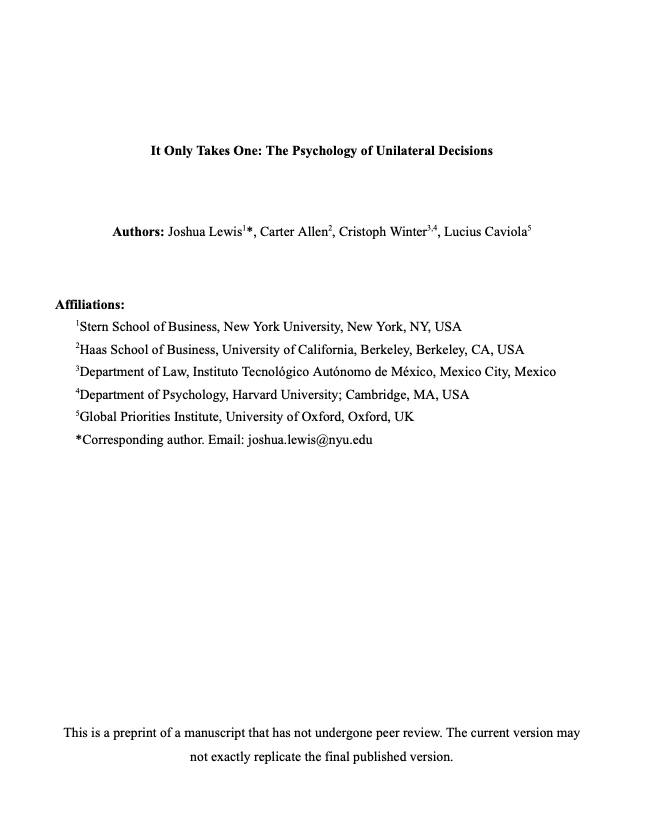It Only Takes One: The Psychology of Unilateral Decisions
Joshua Lewis (New York University), Carter Allen (UC Berkeley), Christoph Winter (ITAM, Harvard University and Institute for Law & AI) and Lucius Caviola (Global Priorities Institute, Oxford University)
GPI Working Paper No. 14-2024
Sometimes, one decision can guarantee that a risky event will happen. For instance, it only took one team of researchers to synthesize and publish the horsepox genome, thus imposing its publication even though other researchers might have refrained for biosecurity reasons. We examine cases where everybody who can impose a given event has the same goal but different information about whether the event furthers that goal. Across 8 experiments (including scenario studies with elected policymakers, doctors, artificial-intelligence researchers, and lawyers and judges and economic games with laypeople, N = 1,518, and 3 supplemental studies, N = 847) people behave suboptimally, balancing two factors. First, people often impose events with expected utility only slightly better than the alternative based on the information available to them, even when others might know more. This approach is insufficiently cautious, leading people to impose too frequently, a situation termed the unilateralist’s curse. Second, counteracting the first factor, people avoid sole responsibility for unexpectedly bad outcomes, sometimes declining to impose seemingly desirable events. The former heuristic typically dominates and people unilaterally impose too often, succumbing to the unilateralist’s curse. But when only few people can impose, who know the stakes are high, responsibility aversion reduces over-imposing.
Other working papers
How to neglect the long term – Hayden Wilkinson (Global Priorities Institute, University of Oxford)
Consider longtermism: the view that, at least in some of the most important decisions facing agents today, which options are morally best is determined by which are best for the long-term future. Various critics have argued that longtermism is false—indeed, that it is obviously false, and that we can reject it on normative grounds without close consideration of certain descriptive facts. In effect, it is argued, longtermism would be false even if real-world agents had promising means…
Estimating long-term treatment effects without long-term outcome data – David Rhys Bernard (Rethink Priorities), Jojo Lee and Victor Yaneng Wang (Global Priorities Institute, University of Oxford)
The surrogate index method allows policymakers to estimate long-run treatment effects before long-run outcomes are observable. We meta-analyse this approach over nine long-run RCTs in development economics, comparing surrogate estimates to estimates from actual long-run RCT outcomes. We introduce the M-lasso algorithm for constructing the surrogate approach’s first-stage predictive model and compare its performance with other surrogate estimation methods. …
Moral uncertainty and public justification – Jacob Barrett (Global Priorities Institute, University of Oxford) and Andreas T Schmidt (University of Groningen)
Moral uncertainty and disagreement pervade our lives. Yet we still need to make decisions and act, both in individual and political contexts. So, what should we do? The moral uncertainty approach provides a theory of what individuals morally ought to do when they are uncertain about morality…

